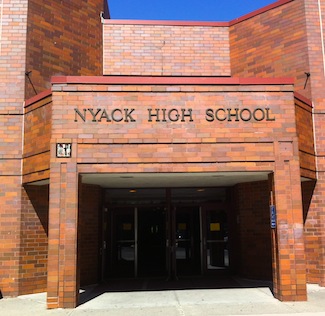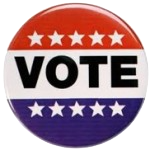 by Juliana Roth
by Juliana Roth
Here’s one more collateral impact of the coronavirus: this year’s Nyack Schools’ budget vote and board election will be 100% vote by mail.
All ballots must be received by June 9 (a post mark prior to June 9 isn’t sufficient to make the cut). Registered voters will be mailed a ballot. Completed ballots can be mailed in or deposited in a drop slot at the Nyack Schools’ administration building on Dickinson Ave. Ballots that aren’t received by 5p on June 9 will not be counted. To find out if you are registered to vote in the school board election, visit NyackSchools.org.
Don’t wait until the last minute to mail in your ballot via the school district supplied 1st class return postage envelopes: as many as 13,000 ballots may be received by the Nyack and Valley Cottage post offices for this election.
The annual trustee and school budget vote was pushed to June 9 by NYS Governor Andrew Cuomo’s executive order earlier this month which mandated that all voting will be by absentee ballot. Schools across the state, already strained by the COVID-19 pandemic, are scrambling to figure out how and who to send ballots to in a matter of weeks. This logistical dilemma magnifies what may play out come the presidential election this fall if social distancing measures are still in place, which seems to be likely.
There are three open seats on Nyack’s Board of Education. Incumbents Beth Davidson, Jen Marraccino and James Marshall are running for re-election; challengers Leeann Irvin and Steven Francisco hope to win a seat on the board.
I spoke with James J. Montesano, Superintendent of Schools, and Linda A. DeCicco, District Clerk, on what this means for our local election, who the candidates are, and what the district might expect.
Your donations made this story possible.
Local news matters now more than ever. Thanks to your support, Nyack News and Views has added additional coverage during the pandemic, hiring local journalists to write COVID-19 related articles. Your donations funded this story.
 We need your help – NOW – to continue this work. Please consider making a one time or sustaining donation to Nyack News And Views. Thank You!
We need your help – NOW – to continue this work. Please consider making a one time or sustaining donation to Nyack News And Views. Thank You!
How does the Nyack School Board election affect our schools?
James J. Montesano: The quality of a community’s school, and election of community leaders to serve on their Board of Education, is one of the most important pillars of our democracy. Voters do not have an opportunity to vote on the spending plan of their town, county, state, or federal budgets. The Nyack/Valley Cottage community have demonstrated their support of past spending plans, which demonstrates the value the community places on educating their young people. The Nyack Schools Board of Education appreciates the trust that has been given to support the Nyack schools, a trust our board does not take lightly as they put forth tremendous time and effort in making fiscally responsible decisions on behalf of the community.
What are the issues at hand for the new school board?
Montesano: School boards of education will confront significant challenges entering the new school year as a result of COVID-19. The prospects of reopening schools will require addressing health and safety concerns, logistics of transportation, restructuring classroom learning to accommodate social distancing, meeting the social emotional needs of students, and the uncertainty of state funding.
Candidates didn’t have to collect signatures to get on the ballot this year. Beth Davidson, Jen Marraccino, James Marshall, Leeann Irvin, and Steven Francisco are running this year. Unlike other years, candidates will be listed by alphabetical order. How might this impact voting?
Montesano: It is an unusual election process. The collection of signatures provides board candidates [an opportunity] to speak with members of the community and discuss their reasons for running for a seat on the board. Equally important to the signatures is the lack of ability for the candidates to canvas the community prior to the election to meet with members of the community. Fortunately, the candidates running for the board are active members of the community and should be well known to many residents.

How Will Vote By Mail Impact Election Results?
An exclusive “vote by mail” election might be new to New York, but it’s the standard operating procedure for residents of Colorado, Hawaii, Oregon, Washington and Utah as well as 21 other states which permit some use of mail in voting. What lessons can New York State learn from the June school board election, should a 100% absentee election prove necessary in November? How do we ensure ballots are received on time? How will districting impact access? Are there ways to increase voter turnout through absentee ballots, or will funding and time limitations challenge engagement? To read more about the benefits and concerns of vote by mail elections, visit National Conference of State Legislatures.
Turn-out is already low for these sorts of elections. What is the precedent for absentee voting in school board elections?
Montesano: This election will be conducted through absentee ballot only. While voters have always had an opportunity to vote via absentee ballot in a school election when they were out of town on the day of the election, a 100% absentee election is unprecedented.
Education Law establishes the procedures for conducting absentee ballots. The dates of the vote have also been rescheduled from May 19 to June 9.
I wanted to clarify who exactly can vote in this election. Other than the typical age and residency status, the statement issued by the district seems to state that you must have registered to vote in past school district elections and have voted in any school district election during the past four calendar years. So, does this mean that there can essentially be no walk-in voter for this election who is otherwise a registered voter? Is it too late for eligible residents to register who are just now learning of the new criteria?
Linda A. DeCicco: If someone is already registered to vote in the school district or for a general election, they must have voted at least once in the past four years, in either a school district election or a general election–otherwise they need to re-register. Due to COVID-19, there will be no personal registration at this time, so someone would have to register online.
How will non-native English speakers be supported in understanding this new process?
DeCicco: Rockland County school districts are not required to provide the documents in any language other than English.
Ballots must be received by June 9. How can someone who’s eligible to vote get a ballot or check to make sure they’re registered for a ballot?
DeCicco: Click the vote information link on our website and enter your name under the “Am I registered?” tab and check to see if you are registered.
What does the proposed budget look like? How is it different from past years’?
Montesano: This year’s budget is consistent with the budgets presented to the community the past nine years by our board of education. In 2011, a law was established to place an annual cap on the tax levy. Each year since its adoption, the Nyack Board of Education has presented a budget that is at or below the established tax levy cap. The proposed budget allocates approximately $4M from fund balance and reserves. The board has also reduced $3M from the original budget proposal as a result of COVID-19’s impact on the economy.
A BIG difference in our budget planning this year is the Governor’s Revenue Reduction Plan. This plan was adopted as part of the State 2020-21 Budget and will call for reductions in the range of 20% of aid to school districts in the event the state is experiencing a budget deficit. There are three review periods extending to December 31, 2020. Given that the state is currently experiencing a deficit in the range of $10-15B, it is highly likely school districts will see a reduction in their state aid and need to further adjust their budgets during the school year. This could mean reductions to Nyack’s state aid of $1.4-$2.4M.
If the budget gets defeated during this time when schools have unbudgeted distance learning costs, it could be devastating to the Nyack School district. What will happen if the budget doesn’t pass?
Montesano: In a typical year, a board of education will have the option of placing the budget, with or without adjustments, one additional time following a defeated budget–or resolve to adopt a contingency budget. Due to the lateness of this year’s budget vote combined with the additional time to process an absentee-only vote, it is believed that school boards will need to adopt a contingency budget only this year. A contingency budget can be no greater than the tax levy from the prior year. In Nyack, a contingency budget would result in an additional $1.4M reduction in the proposed budget. This would be in addition to the anticipated reduction in state aid that may be in the range of $1.4-$2.4M.
Juliana Roth is a writer from Nyack, NY who is the Chief Storyteller at the Edward Hopper House Museum & Study Center .








